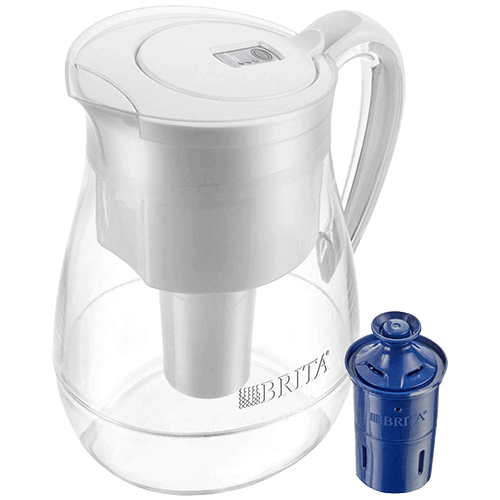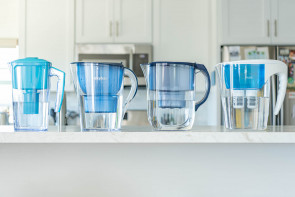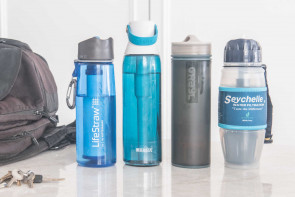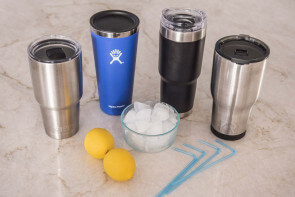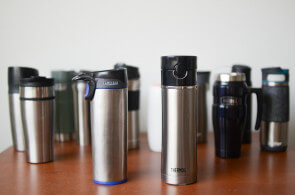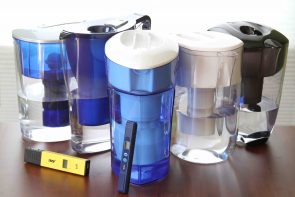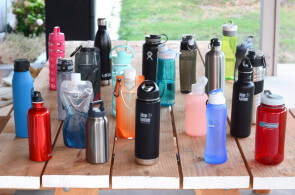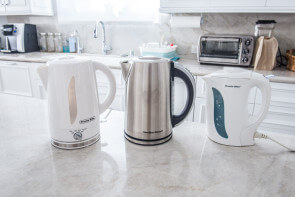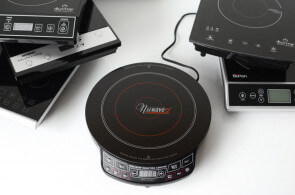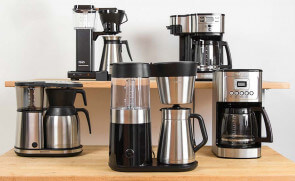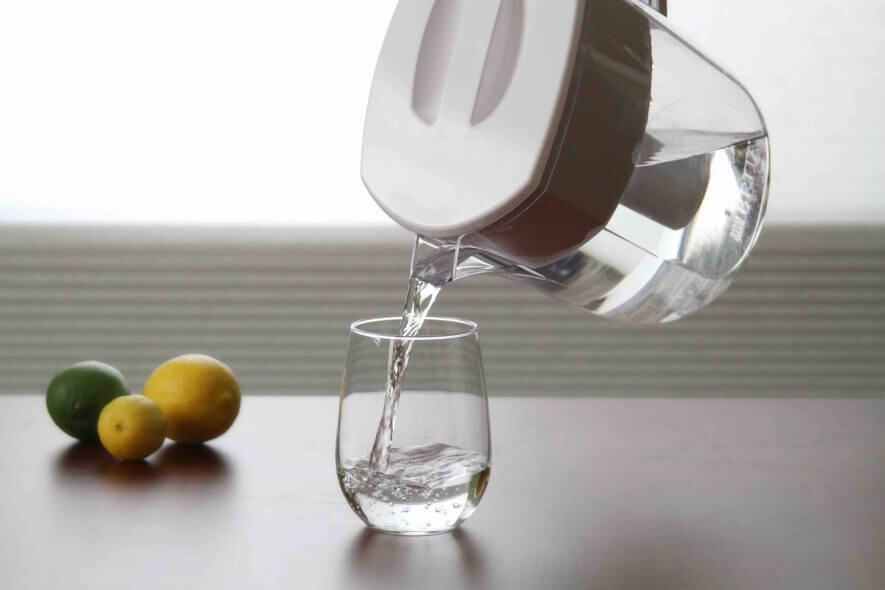
Brita Water Pitcher Review
With an estimated 70% percent of North American sales, Brita water filters are the market leaders in the pour-through water filter market. Since 1988, Brita has been synonymous with water filters after decades of successful marketing, competitive pricing and wide availability. The new Brita – Longlast filter adds to that reputation by removing lead, along with pesticides and pharmaceutical compounds, and an unmatched 120 gallon filter life. However, as we’ll explain below, the ZeroWater system is a strong competitor that provides the elusive mineral-free flavor profile many hydration enthusiasts crave.
Featured Product
With an estimated 70% percent of North American sales, Brita water filters are the market leaders in the pour-through water filter market. Since 1988, Brita has been synonymous with water filters after decades of successful marketing, competitive pricing and wide availability. The new Brita – Longlast filter adds to that reputation by removing lead, along with pesticides and pharmaceutical compounds, and an unmatched 120 gallon filter life. However, as we’ll explain below, the ZeroWater system is a strong competitor that provides the elusive mineral-free flavor profile many hydration enthusiasts crave.
Table of contents
- Do Brita filters work?
- Standard Brita filter vs. Longlast
- What we didn’t like about the Brita pitcher
- Brita’s place in the market
- How do Brita filters compare to others?
- Should you buy a Brita water filter pitcher?
Do Brita filters work?
For the most important contaminants, standard Brita filters are certified by NSF International to remove chlorine and several harmful metals. That’s on par with most pitcher filters, with a proprietary blend of activated carbon and a small amount of ion-exchange resin.
| Product | Seconds to Filter 1 Cup | Minerals Remaining (Starting 500 PPM): | Filter Cost per Gallon | Removes Lead |
|---|---|---|---|---|
| Brita – Longlast | 188 | 300 | $0.09 | Yes |
| ZeroWater | 110 | 0 | $0.33 | Yes |
| PUR – Lead Reduction | 230 | 450 | $0.18 | Yes |
| Clearly FIltered | 730 | 400 | $0.46 | Yes |
| Brita – Standard | 40 | 350 | $0.10 | No |
| Waterdrop | 49 | 122 | $0.05 | No |
| Epic Pure | 223 | 141 | $0.24 | Yes |
| Aquagear | 85 | 205 | $0.37 | No |
| BWT (Discontinued) | 45 | 425 | $0.15 | No |
Standard Brita filters are also able to filter water quickly. In fact, during our testing, we found that the Brita filter was actually the fastest at filtering a cup of water out of all five water filter pitchers we tested.
Standard Brita filter vs. Longlast
The new Brita – Longlast filters take this foundation and add a micro-porous carbon-impregnated fiber filter. We’re not sure about which parts of the filter have the most effect on the improved performance, but the Longlast system is certified to remove lead, asbestos, some volatile organic compounds and three pharmaceutical compounds. The flow rate goes down, so you’ll have to wait longer, but it’s not as slow as the comparable PUR filters.
Brita filters are also the best value. While the prices will vary depending on where you are buying (and what the current deals or promotions are), overall Brita filters offer among the lowest cost per cup of water filtered. The improved longlast filters are more expensive, but they last so much longer that they’re the best value on the market in terms of cost per gallon.
The filters for a Brita water pitcher are also widely available, which makes replacing them notably easier than for some of the less well-known brands.
What we didn’t like about the Brita pitcher
While there are certainly things to like about the Brita water filter pitcher, there were several negative issues we found while testing them.
First (and arguably most importantly), Brita filters don’t do much for hard-water minerals. They keep pace with brands like PUR, but ZeroWater filters are able to completely remove mineral ions from your water.
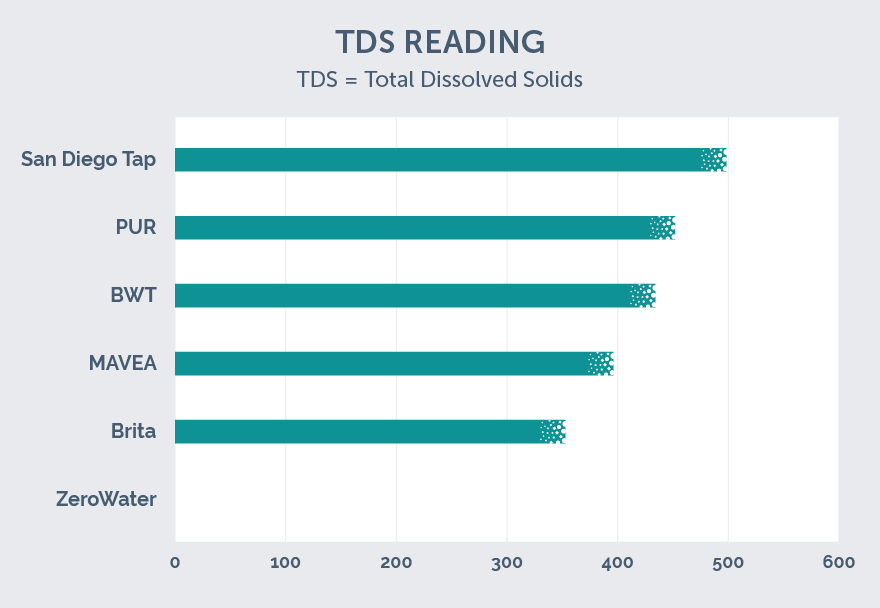
We also found the Brita – 10-Cup Pitcher bulky and cumbersome to carry and use. Whether we were carrying the pitcher to or from the sink, or simply pouring water into the glass, it felt like there was a lack of attention to detail when designing the Brita pitcher.
When the Longlast filter was first introduced, you had to buy it separately from the pitcher, leaving you with an orphaned standard Brita filter that you’d likely never used. Fortunately, Brita now sells the rounded Monterey and space-saving Everyday pitchers with the new filter. We wish they’d package it with all their pitchers, though.
Brita’s place in the market
There is no doubt that the Brita water filter is the undisputed market leader. The combination of low-cost filters and pitchers, nearly three decades in the North American market, and a series of successful marketing and retail placement campaigns have ensured that Brita will be a popular water filter brand for many years to come.
Brita’s competitors are fighting for a comparatively small slice of the market. ZeroWater, in particular, has targeted and focused on the higher end of the market, while still keeping their filters reasonably affordable — though they are more expensive than Brita filters.
Time will tell if Brita is able to remain the market leader, or if they will gradually lose market share to competitors like ZeroWater — now the second-place brand in pour-through water filter sales.
How do Brita filters compare to others?

Although it doesn’t tend to market itself as such, Brita is effectively the “discount brand” in the water filter pitcher market. In addition to being among the least expensive, it is simple, reliable, and virtually ubiquitous.
Brita vs. PUR
Pur is another popular brand, better known for its faucet-mounted filter market. We weren’t particularly impressed with their filter pitcher because filtration time was notably slow, and some of our taste testers found the water to taste “artificial.”
When PUR held the distinction of being the most affordable lead-removing filter, there was a real choice to be made. Now that Brita’s Longlast filter holds similar certifications, but filters 200% more water with only a 60% price increase, the best value is clear.
Wirecutter switched their top filter pitcher pick to PUR in 2019, and it seems that’s mostly because of the extra certifications
and a few clogging issues with the Brita – Longlast.
PUR has a comparison page showing their filters certified for removal of the VOC solvents benzene, carbon tetrachloride and tetrachloroethylene, along with three popular weed killers, while Brita’s Longlast filter is only certified in these categories for removing benzene. Both brands picked three pharmaceutical compounds but not the same three.
Does the longer list mean the PUR is a better filter? No. According to standard carbon filter performance charts, these VOC compounds and herbicides are all expected to be captured in about the same way (a high or very high probability of being absorbed) by activated carbon.
If you’re looking for more-complete filtering of organic chemicals like industrial by-products, our picks for faucet-mount water filters pass the most difficult VOC test. You can search NSF and WQA databases just in case someone has specifically tested for the compound you’re worried about, but that’s a frustrating process. The lead-removing filter pitchers are each grabbing some VOCs, but neither brand is a clear leader.
As far as clogging, we haven’t had any issues in our two years with the Brita Longlast filters. We did have issues with a PUR filter right out of the gate, though. We’ll call that a toss-up.
If you’re choosing between a Brita pour-through water filter pitcher or one by PUR, we would recommend the Brita, but make sure you get the long-lasting, lead-removing blue version of the filter.
Brita vs. ZeroWater
Brita and ZeroWater are the two industry leaders in the pour-through water filter pitcher market, with Brita owner the vast majority of that market (around 70%).
That being said, Brita and ZeroWater occupy vastly different segments of the market. While Brita water filters are inexpensive and able to filter water very quickly, ZeroWater filters are more expensive and are able to reduce contaminants in the water to effectively zero.
Should you buy a Brita water filter pitcher?
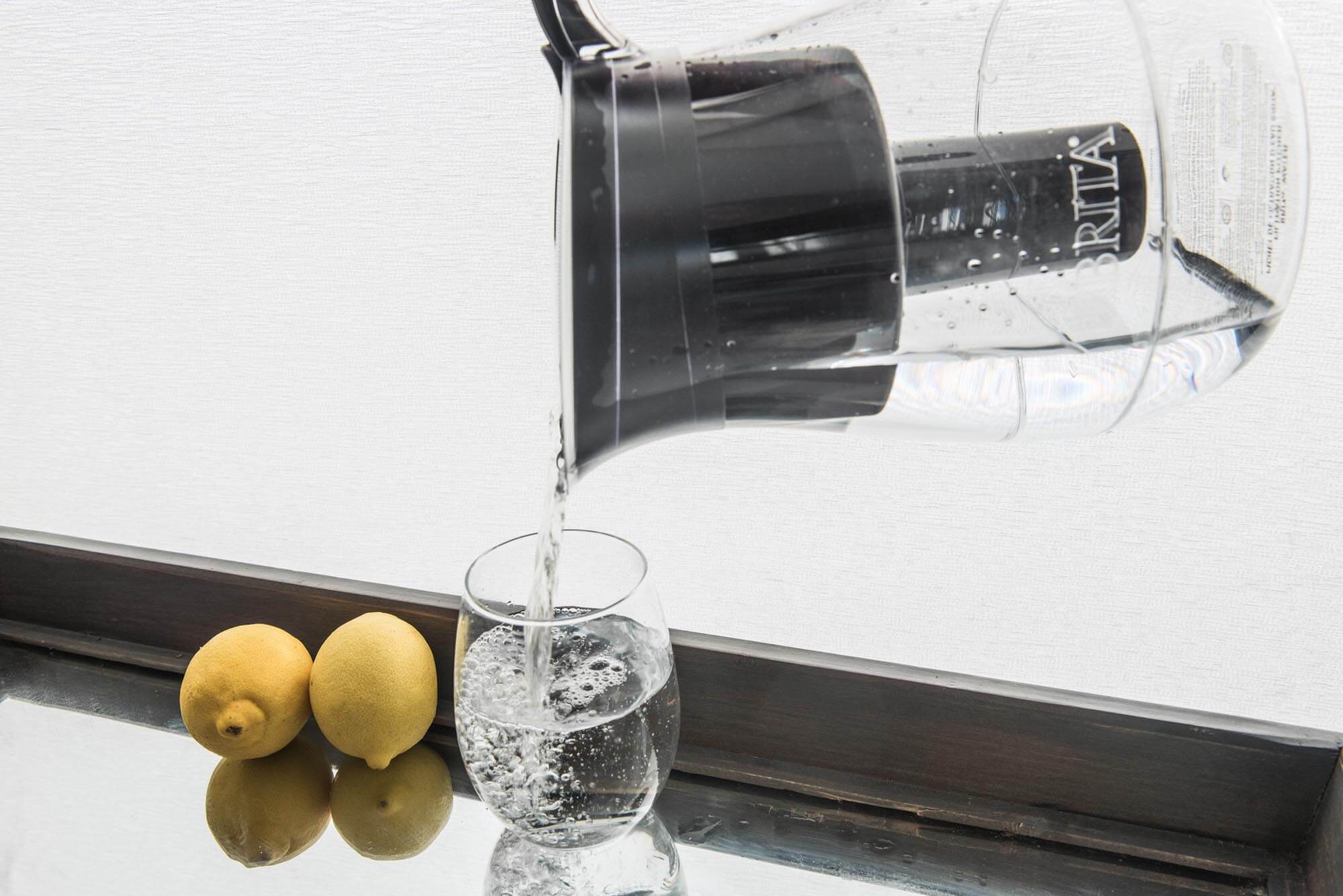
If you want a water filter pitcher that is cheap and ubiquitous, Brita is certainly worthy of consideration. There’s a reason why Brita water filters have been popular for so long.
That said, the ZeroWater filter will remove the chemicals that Brita leaves untouched. Hard-water minerals, fluoride, iron, and even hydrogen sulfide are all ZeroWater’s forte.
For a more detailed dive into all the differences, take a look at our extensive review of the four best water filter pitchers.
More Reviews
The 11 Best Expandable Garden Hoses
Joey's Garden Expandable Hose
The Best Alkaline Water Filter Pitchers
Brita - Longlast
The Best Filtered Water Bottles
Brita - BB10
Brita - FF-100
RTIC - 30-Ounce Tumbler
Thermos - Sipp
The 7 Best Water Filter Pitchers
Brita - 10-Cup Everyday Pitcher
Klean Kanteen - 20-Ounce Insulated
Hamilton Beach - 41020
The Best Portable Induction Cooktops
Duxtop - 9600LS
OXO - Barista Brain
Anolon - Advanced


